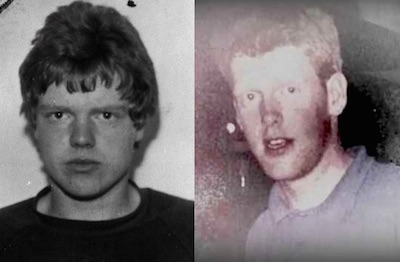
A former MI5 surveillance ‘spook’ has described how he followed IRA Volunteer Diarmuid O’Neill for months before he was shot dead in a boarding house in London.
Codenamed Robert Acott, the former British military intelligence officer has also admitted breaching internationally treaties by crossing the border without the permission of the Irish foreign office. He said he made illegal incursions into the 26 Counties tracking republicans and meeting with double agents.
Speaking to reporter Nick Hopkins for a BBC Newsnight investigation, Acott says he travelled all over the world for MI5, following suspects, including alleged IRA members to Europe and the Middle East on a passport with a false identity.
Among those he claimed to have been following was Diarmuid O’Neill (pictured, right) who was shot dead in London in 1996 in an early-morning raid on the hotel where he was staying.
The only IRA member to be shot dead by police in England, Amnesty International at the time called for an investigation into the shooting.
“I followed him day in day out for absolute months and I know it seems a bit strange to say but when he was actually killed I felt a bit sad for him,” he said.
Denis O’Donovan, Fianna Fail’s justice spokesman in the Seanad, said he would be looking into raising the matter with the Justice Minister Frances Fitzgerald.
COVER-UP
Meanwhile, a criminal conspiracy by MI5 to obstruct one of the most sensitive murder inquiries of the conflict has been confirmed following the emergence of key sections of a previously secret police investigation.
The report details how MI5 spies concealed the existence of an audio recording of an incident in which the RUC police shot dead an unarmed teenage boy, Michael Tighe (pictured, left), in 1982 and then destroyed the tape to prevent it falling into the hands of the detective who was asked to investigate the killing.
The report recommended that the two highest-ranking MI5 men in the Six Counties - be prosecuted for perverting the course of justice.
Its author, Colin Sampson, then chief of police in West Yorkshire, condemned MI5’s concealment of a key piece of evidence during a murder inquiry as “wholly reprehensible”, and said those responsible were guilty of “nothing less than a grave abuse of their unique position”. He added in his report that the excuse they had given for failing to hand over the recording was “patently dishonest”.
Sampson reported that he had gathered sufficient evidence to justify the prosecution of three MI5 members for their roles in the conspiracy.
In the event, none were prosecuted after the then British attorney general, Patrick Mayhew, said the government did not believe it to be in the interests of national security to bring them to trial. Mayhew’s statement made no mention of MI5, however, and was framed in a way that led MPs to believe that Sampson had recommended only police officers be prosecuted.
Sampson’s report remained secret for 30 years. However, sections of the report were included in submissions to the court of appeal in Belfast when a survivor of the police shooting, Martin McCauley, successfully appealed against his conviction for possession of rifles.
![[Irish Republican News]](https://republican-news.org/graphics/title_gifs/rn.gif)
![[Irish Republican News]](https://republican-news.org/graphics/title_gifs/harp.gif)

